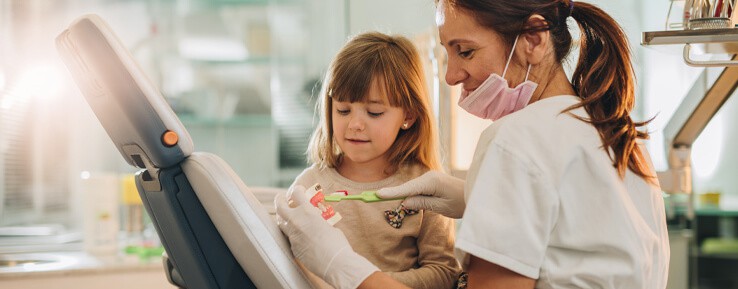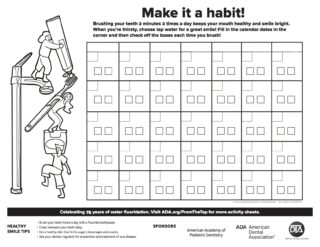Benefits of Early Childhood Dental Visits

Because this month is National Children’s Dental Health Month, we discuss the importance of bringing your child to the dentist early in life. Early and routine visits for your little ones leads to a life long healthy mouth. We’re answering some of the most common questions parents have regarding their children’s dental visits.
How early should my child see a dentist?
The American Academy of Pediatric Dentistry recommends a child go to the dentist within 6 months of getting their first tooth and no later than their first birthday.
What is done at their first appointment?
A large part of your child’s first appointment is familiarizing them to the dental environment. The dentist examines the mouth for not just cavities but any developmental issues as well. Some issues we keep an eye out for are misaligned teeth, missing teeth, the eruption pattern of their teeth and signs of infections.
What are the benefits of early childhood visits?
Familiarity
Some children may need to become more familiar with the dentist before they sit in the chair. So the earlier a child experiences the dentist, the easier it is to set them up for less anxiety for appointments later on. Because of this, suggest your little one sits in on an older sibling’s dental visit, if they have one.
Prevention
Counseling early on prevents serious diseases later in your child’s life. Did you know that cavities are the #1 chronic disease in children? Discuss your child’s diet, brushing techniques and habits with your dentist or dental hygienist. This will ensure that they give you tips on preventing this widespread disease. For a little extra help getting your little ones motivated, check out our previous blog on 7 Tips to Get Your Child to Have FUN Brushing.
Early prevention includes sealing healthy teeth. Sealants fill up the grooves of your little one’s back teeth. As a result, this prevents food from trapping and making it easier to clean. This means less of a chance to get cavities!
In these appointments habits that can be determintal to their mouth, such as, thumb sucking, extended pacifier use or sleeping with a bottle of milk can be discussed as well.
Celebrate National Children’s Dental Health Month by setting up your little one’s first dental appointment. Use this month also to remind your children of good oral hygiene habits, such as brushing twice a day, flossing once a day and limiting sugary snacks.
Have children that need a little extra motivation? Print out this monthly brushing and flossing chart made by the American Dental Association. Be sure to fill it out together!




